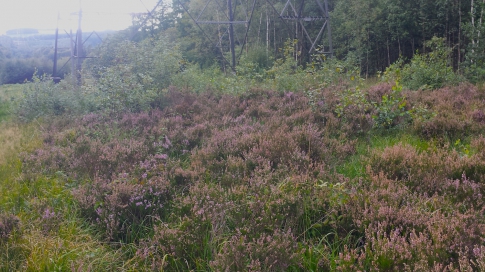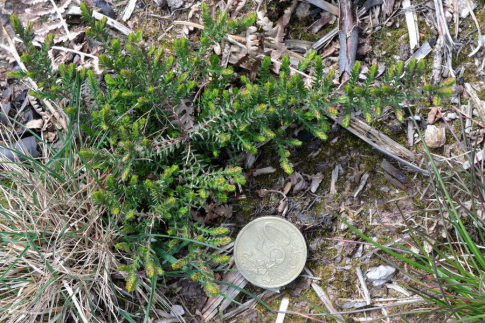News
2016-02-11
A wide range of actions in Winenne (Beauraing, Belgium)
The decision to work on the forest corridor for the power line crossing the Bois du Roy in Winenne (Municipality of Beauraing, Namur Province, Belgium) has resulted in the widening of the corridor on both sides of the line. Then germinated the idea of restoring a heather moor, a natural habitat protected by Natura 2000 directive.
Soil scraping in 2014
The first step was to uproot birch trees on the site. Remaining patches of old heathers were not touched. They show the interest for soil scraping, which consist in removing the topsoil few first centimeters to allow seed bank.

Patches of heather conserved on site

Soil scraping on areas without heather with side swaths, 2014
The result was not long to be seen, since young seedlings appeared in 2015 on the bare land. Experience has also shown us that in some places, seedlings appear only after the second year after soil scraping.

Seedling of heather after 1 year

In total, 4.7 hectares were restored Winenne in order to retrieve a heather moor, a Natura 2000 habitat.
Management of the restored area and of interest of having swaths
To offer maximum light to young seedlings and thus promote their development, we have also undertaken a clearing of eagle ferns that were becoming too dense in 2014 and 2015. The cut ferns were then piled on the side swaths composed of stones resulting from the soil scraping. Such mounts rich in crevices and well exposed to sun is a safe choice for lizards, snakes among them the rare and endangered common European adder whose population subsists a few kilometers away in France.

Common European adder
Digging 4 ponds
In some areas of the site, water stagnations were also visible. These is a favorable conditions for the digging of ponds. In this context, a permit authorization has been introduced in order to dig 4 ponds of 100 m2 each. In the end of 2014, excavators came into action to dig ponds having a design as natural as possible, that is to say, irregular shapes of the banks and with gentle slopes.
Such ponds are quickly colonized, including by dragonflies and amphibians. During spring 2015 inventories, 2 species of newts (alpine and punctuated) were already found in these water points. Colonization by plants takes it a little longer.

Freshly dug pond in late 2014

The same pond in spring 2015

The pond in late 2015
Planting of wild apple trees and junipers
Finally, among the actions implemented on this site also included planting a small orchard of wild apple trees as well as wild juniper of Walloon origin.

Juniper trees have a very slow growth and are threatened in Wallonia. Also, the Department of the Study of the Natural Environment and Farming (Public Administration of Wallonia) conducted a campaign to spread them on basis of selected stems. The LIFE Elia has contributed to spread the species by planting it in several power lines such as Winenne.


